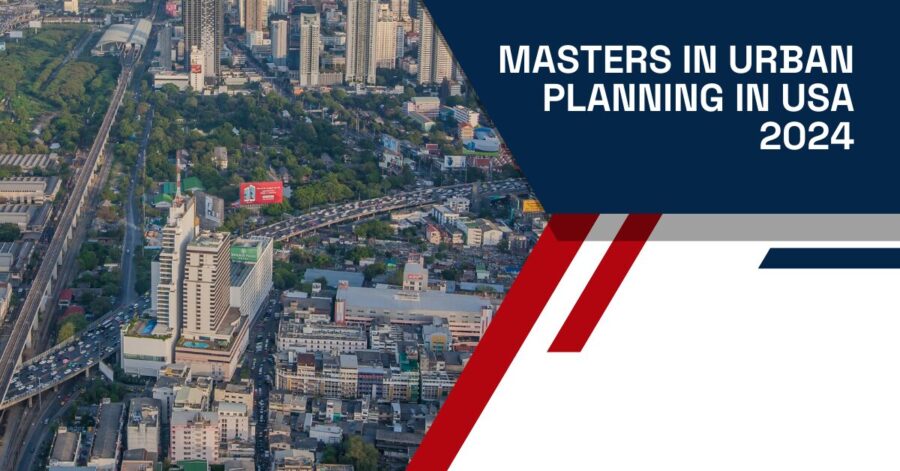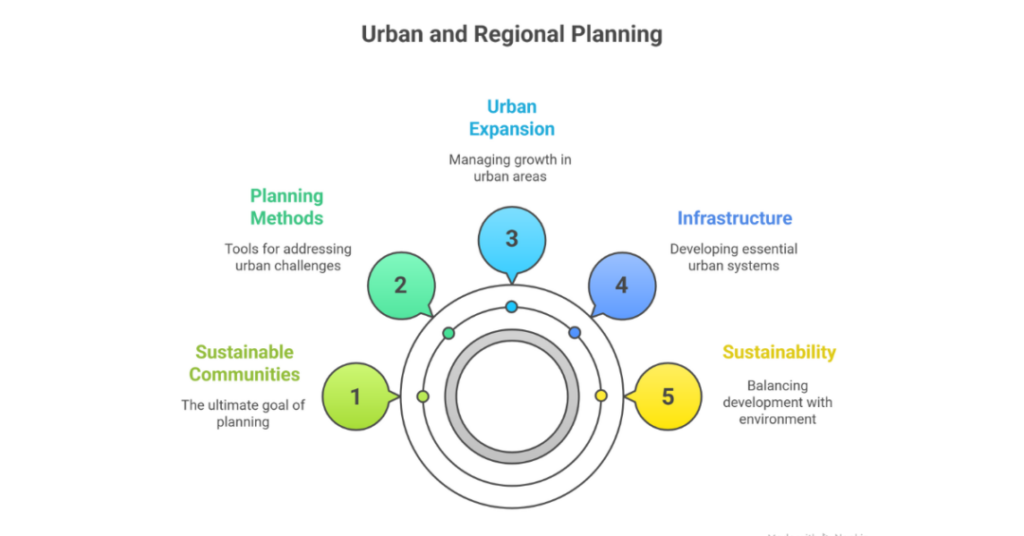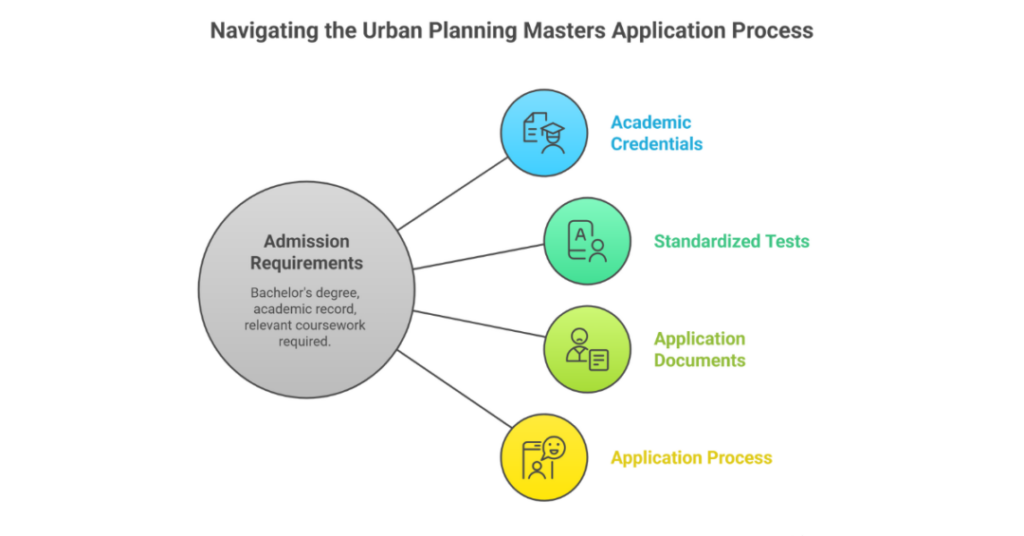9 August 2025
6 minutes read
10 Top Universities for Masters of Urban Planning in USA for Indian Students

Key Takeaways
- Pursuing a Master’s in Urban Planning in the USA offers top-tier education and diverse career opportunities in global urban development.
- Carefully consider program structure, duration, and financial commitments before choosing a university.
- Admission requirements vary but often include a strong academic background, GRE scores, and relevant professional or academic experience.
Over 83% of the U.S. population resides in growing urban areas, driving a surge in demand for urban and regional planners. However, students taking up a Masters in Urban Planning in USA often grapple with the brutal reality of choosing the right accredited planning course, navigating complex program requirements, and bridging the gap between planning education and real-world practice.
Thankfully, top study programs accredited by the Planning Accreditation Board offer robust professional planning education, teaching students crucial public policy, city design, community and economic development, and analytical techniques. These degrees empower future professional planners with essential knowledge and skills, ensuring MUP students complete their programs ready for meaningful careers in both public and private sectors.
What is Urban and Regional Planning?
Urban and regional planning is all about designing and managing the spaces where we live, work, and play. It focuses on creating sustainable communities, often overlapping with landscape architecture, to shape cities and regions. This field prepares professionals to balance development with environmental protection and urban challenges.

A fully accredited planning degree provides students with the knowledge of planning methods needed to tackle modern-day issues. Programs offer a foundation that prepares graduates to provide solutions for urban expansion, infrastructure, and sustainability in a fast-changing world.
Why Study Urban Planning in the USA?
Studying a Masters in Urban Planning in USA places students at the heart of the world’s most diverse urban environments, preparing them to tackle critical planning issues like land development, international development, and community planning. American universities offer some of the best master degrees in urban and regional planning accredited by the Planning Accreditation Board, blending rigorous coursework with practical techniques and skills necessary for today’s planning profession.
These top urban planning programs, often housed within a renowned college of architecture or a dedicated department of urban planning and policy, ensure students learn to understand complex urban challenges. Students also benefit from Optional Practical Training (OPT) in western states (e.g., California), opportunities for professional connections through the American Planning Association, and advanced specializations such as a Master of Urban Spatial Analytics, positioning them for impactful careers in both design and development sectors.
Top Universities for Urban Planning in the USA
When choosing where to pursue a Master’s in Urban Planning in the USA, it’s essential to consider both the program offerings and the cost. Below is a list of top universities, their courses, and estimated tuition fees to help guide your decision.
| University Name | Course Offered | Estimated Tuition Fee (Per Year) |
|---|---|---|
| Massachusetts Institute of Technology | Master in City Planning (MCP) | $53,790 |
| Harvard University | Master in Urban Planning (MUP) | $58,400 |
| University of California, Berkeley | Master of City Planning (MCP) | $26,544 (in-state), $44,598 (out-of-state) |
| University of Pennsylvania | Master of City Planning (MCP) | $57,334 |
| Columbia University | Master of Science in Urban Planning | $62,840 |
| University of Southern California (USC) | Master of Urban Planning (MUP) | $65,376 |
| New York University (NYU) | Master of Urban Planning (MUP) | $54,880 |
| University of Michigan | Master of Urban and Regional Planning (MURP) | $26,584 (in-state), $52,272 (out-of-state) |
| Cornell University | Master of Regional Planning (MRP) | $40,888 |
| University of North Carolina | Master of City and Regional Planning (MCRP) | $25,000 (in-state), $46,000 (out-of-state) |
| University of Illinois | Master of Urban Planning (MUP) | $15,642 (in-state), $29,760 (out-of-state) |
| University of Washington | Master of Urban Planning (MUP) | $21,297 (in-state), $39,351 (out-of-state) |
| University of Texas at Austin | Master of Science in Community and Regional Planning (CRP) | $12,028 (in-state), $22,846 (out-of-state) |
| Georgia Institute of Technology | Master of City and Regional Planning (MCRP) | $16,000 (in-state), $33,000 (out-of-state) |
| Rutgers University | Master of City and Regional Planning (MCRP) | $19,402 (in-state), $30,400 (out-of-state) |
What is the Program Structure and Duration for a Masters in Urban Planning in USA?
Understanding the program structure and duration of a Master’s in Urban Planning in the USA is crucial for students planning their academic journey.
| Aspect of Program | Details |
|---|---|
| Program Length | Typically a two-year full-time program. Some universities offer part-time options extending over 3-4 years. |
| Core Curriculum | Includes foundational courses in urban theory, policy analysis, land use planning, environmental planning, and urban design. |
| Specializations | Options may include Urban Design, Transportation Planning, Environmental Planning, and Community Planning, among others. |
| Elective Courses | Students can choose from a range of electives to tailor their education to specific interests or career goals. |
| Practical Experience | Programs often incorporate internships, workshops, and field projects to provide real-world planning experience. |
| Capstone or Thesis | Most programs require a final project or thesis demonstrating the application of learned concepts to a real urban planning challenge. |
| Accreditation Standards | Accredited by organizations like the Planning Accreditation Board (PAB), ensuring a high-quality education aligned with industry standards. |
| International Opportunities | Some programs offer study abroad options or international project work, providing a global perspective on urban planning. |
| Flexible Scheduling | Many programs offer evening and weekend classes to accommodate working professionals. |
| Technology and Tools | Courses often include training in the latest urban planning software and technology, such as GIS and spatial analysis tools. |
What are the Financial Considerations for Doing a Masters in Urban Planning in USA?
Pursuing a Master’s in Urban Planning in the USA involves significant financial planning. This section will explore the various costs, scholarships, and funding options available to help you manage the financial considerations of your degree.
| Expense Type | Description | Average Cost (USD) | Financial Aid Options |
|---|---|---|---|
| Tuition Fees | Cost for enrollment in the program | $30,000 – $50,000 per year | Scholarships, Grants, Work-Study Programs |
| Living Expenses | Includes accommodation, food, transportation, and personal expenses | $12,000 – $20,000 per year | Part-time employment, On-campus housing, Budget management |
| Textbooks and Supplies | Books, software, and other academic materials | $1,000 – $2,000 per year | Used books, Digital resources, Library services |
| Health Insurance | Mandatory for most international students | $2,000 – $3,000 per year | University health plans, Private Insurance |
| Travel and Miscellaneous | Costs for commuting, leisure, and unexpected expenses | Variable | Budgeting and planning, Student discounts |
What are the Admission Requirements and Processes for a Masters Degree in Urban Planning?
Admission requirements for a Master’s degree in Urban Planning typically include a bachelor’s degree from an accredited institution, a strong academic record, and relevant coursework in fields like geography, architecture, or environmental studies.

Applicants are often required to submit GRE scores, letters of recommendation, a statement of purpose, and a portfolio of work if applicable. International students may need to provide TOEFL or IELTS scores. The application process generally involves submitting these documents through the university’s online portal, followed by an interview or additional assessments for certain programs.
What are the Career Prospects and Opportunities for Urban Planning Graduates in USA?
Graduates of urban and regional planning programs find opportunities in various sectors:
| Career Role | Sector | Typical Responsibilities | Skill Requirements |
|---|---|---|---|
| Urban Planner | Government, Non-profit, Private Consulting | Developing and reviewing land use plans, community development, and policy analysis | Strategic thinking, Communication, Knowledge of zoning and environmental regulations |
| Transportation Planner | Public Agencies, Transportation Authorities, Consulting Firms | Planning and designing transportation systems, traffic management, and public transit planning | Analytical skills, Understanding of transportation software, Stakeholder engagement |
| Environmental Planner | Environmental Agencies, Consulting Firms, Urban Planning Departments | Assessing environmental impact, sustainability planning, natural resource management | Knowledge of environmental policies, GIS skills, Problem-solving |
| Community Development Planner | Community Organizations, Local Governments, Non-profits | Engaging with communities, planning for social and economic development, grant writing | Community engagement, Cultural awareness, Project management |
| Urban Designer | Architectural Firms, Urban Development Companies, Municipalities | Designing urban spaces, creating urban design guidelines, landscape planning | Design skills, Creativity, Understanding of urban aesthetics and functionality |
| Policy Analyst | Think Tanks, Government Agencies, Research Organizations | Researching and analyzing policies, advising on policy development, impact assessment | Research skills, Critical thinking, Policy formulation, and evaluation expertise |
Conclusion
Pursuing a masters in urban planning in USA is more than just obtaining a professional degree—it equips students with advanced planning practice skills and real-world experience. Whether entering from an undergraduate degree or a related field, every student must engage in rigorous study planning, as the degree program thoroughly prepares students to tackle complex urban challenges.
A PAB-accredited master program offers students the chance to dive deep into the science in urban and regional development, ensuring students learn how to understand diverse urban contexts effectively. Students may receive specialized training, internships, and networking opportunities. Students are also encouraged to collaborate, with each student’s background enriching the learning environment. Ultimately, students can get rewarding careers shaping the future of sustainable communities.
Begin your journey to studying in the USA, the land of diverse educational opportunities, with Ambitio. Our platform provides you with the tools and insights to navigate the vast landscape of American universities, helping you find the perfect institution that aligns with your academic goals and aspirations.
FAQs
What does a Master’s in Urban and Regional Planning entail?
A Master’s in Urban and Regional Planning focuses on developing skills in land use planning, community development, environmental sustainability, and economic growth, preparing graduates for diverse roles in urban planning.
How long does it take to complete a Master’s in Urban and Regional Planning in the USA?
Most programs are structured as two-year degree courses, combining theoretical learning with practical experiences like internships and project work.
What are some common specializations in Urban Planning?
Key specializations include Urban Design, Transportation Planning, Environmental Planning, and Community Planning, each focusing on different aspects of urban development.
Are there opportunities for international students in these programs?
Yes, the USA welcomes international students in urban planning programs, offering diverse cultural perspectives and global insights into urban challenges.
How important is accreditation for a Master’s in Urban and Regional Planning program?
Accreditation, such as from the Planning Accreditation Board, ensures the program meets high educational standards and is crucial for career advancement in the field.
Is GRE required for admission to urban planning programs in the USA?
Most universities require GRE scores, but some may offer waivers based on work experience or academic background.
What is the typical structure of a Master’s in Urban Planning program?
The program usually includes core courses in planning theory, methods, and electives in areas like sustainability, transportation, or housing.

You can study at top universities worldwide!
Get expert tips and tricks to get into top universities with a free expert session.
Book Your Free 30-Minute Session Now! Book a call now




























